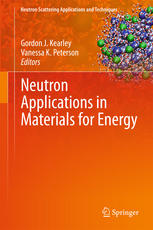

Most ebook files are in PDF format, so you can easily read them using various software such as Foxit Reader or directly on the Google Chrome browser.
Some ebook files are released by publishers in other formats such as .awz, .mobi, .epub, .fb2, etc. You may need to install specific software to read these formats on mobile/PC, such as Calibre.
Please read the tutorial at this link: https://ebookbell.com/faq
We offer FREE conversion to the popular formats you request; however, this may take some time. Therefore, right after payment, please email us, and we will try to provide the service as quickly as possible.
For some exceptional file formats or broken links (if any), please refrain from opening any disputes. Instead, email us first, and we will try to assist within a maximum of 6 hours.
EbookBell Team

4.0
86 reviewsNeutron Applications in Materials for Energy collects results and conclusions of recent neutron-based investigations of materials that are important in the development of sustainable energy. Chapters are authored by leading scientists with hands-on experience in the field, providing overviews, recent highlights, and case-studies to illustrate the applicability of one or more neutron-based techniques of analysis. The theme follows energy production, storage, and use, but each chapter, or section, can also be read independently, with basic theory and instrumentation for neutron scattering being outlined in the introductory chapter.
Whilst neutron scattering is extensively used to understand properties of condensed matter, neutron techniques are exceptionally-well suited to studying how the transport and binding of energy and charge-carrying molecules and ions are related to their dynamics and the material’s crystal structure. These studies extend to in situ and in operando in some cases. The species of interest in leading energy-technologies include H2, H+, and Li+ which have particularly favourable neutron-scattering properties that render these techniques of analysis ideal for such studies and consequently, neutron-based analysis is common-place for hydrogen storage, fuel-cell, catalysis, and battery materials. Similar research into the functionality of solar cell, nuclear, and CO2 capture/storage materials rely on other unique aspects of neutron scattering and again show how structure and dynamics provide an understanding of the material stability and the binding and mobility of species of interest within these materials.
Scientists and students looking for methods to help them understand the atomic-level mechanisms and behaviour underpinning the performance characteristics of energy materials will find Neutron Applications in Materials for Energy a valuable resource, whilst the wider audience of sustainable energy scientists, and newcomers to neutron scattering should find this a useful reference.